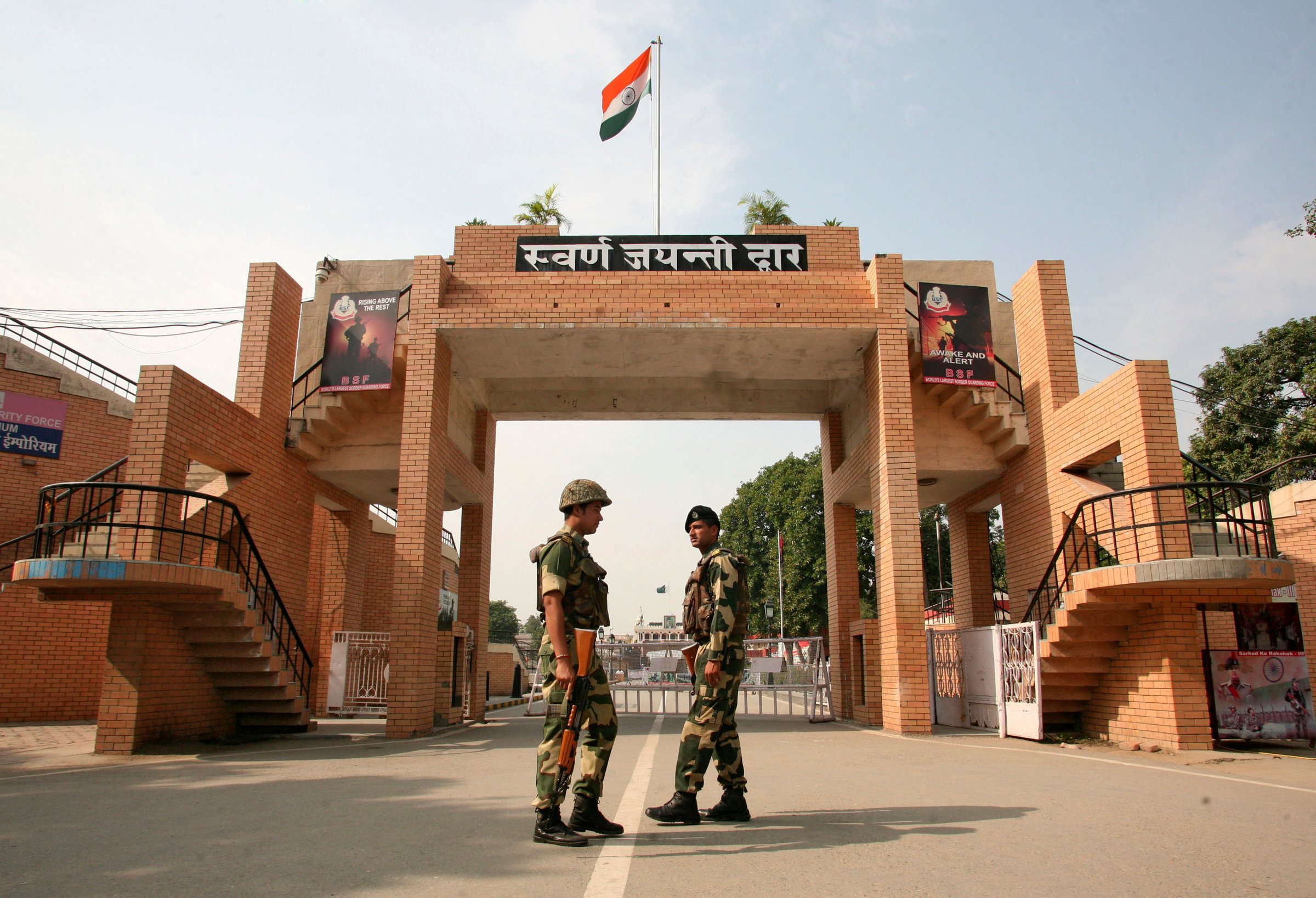
India and Pakistan conducted their traditional flag-lowering ceremony at the Wagah border crossing on Monday evening, a day after a terrorist killed nearly 60 people in a suicide bombing on the Pakistani side.
Taking place at the only land crossing between the two neighbors, the ceremony is a major tourist attraction. There was talk of it being canceled, but in the event it went ahead, sending a message to the militants.
“Today’s ceremony proved that terrorists cannot lower the spirit of the nation by their cowardly activities,” said Lieut. General Naveed Zaman, commander of Pakistan’s Lahore Corps.
Multiple militant organizations — all splinter groups of the Pakistani Taliban — are claiming responsibility for Sunday’s attack, saying it was in response to the Pakistan army’s recent anti-insurgency crackdown in the country’s North Waziristan region. But the attack’s implications for India — which has fought three wars with Pakistan — cannot be ignored, several experts speaking to TIME say.
“It is difficult to believe that whoever was involved in planning this attack did not have any idea of its implications,” says Radha Kumar, director of the Delhi Policy Group. Kumar adds that trade and travel between the two countries, already at a bare minimum, would likely be impacted. “With flights between the two countries down to one a week, more and more people are using Wagah to cross over,” she says.
Ved Marwah, chairman of the Indian government’s task force on National Security and the Criminal Justice System and author of the book Uncivil Wars: Pathology of Terrorism in India, said India presents the “No. 1 target” for any forces threatening the security and stability of Pakistan. “I think it’s a very serious threat, we can’t take it lightly,” Marwah says. “The very fact that three organizations are claiming credit for this particular incident shows how deep the infection has infiltrated into Pakistan.”
The two countries have engaged in an on-again, off-again dialogue toward peace over the years, and their recent relationship has been tense mainly because of escalating military conflicts in the contentious Kashmir region. India has long accused the ISI, Pakistan’s intelligence agency, of encouraging and even facilitating cross-border terrorism, but the apparent lack of control over these groups has alarm bells ringing on both sides of the border.
“I think the primary message of this explosion is for Pakistan, these groups are saying that despite the dislocation of the Pakistani Taliban they still have power to challenge the state,” said Hasan Askari Rizvi, a prominent Pakistani defense analyst, explaining the likely motives behind Sunday’s attack. “India will have to recognize that not all groups are under Pakistani control,” Rizvi says.
A degree of skepticism remains on the Indian side, however, and an Indian government official speculated to the Economic Times that the bomber’s intended target was India.
“They may not be [under the ISI],” says Marwah, “but the fact is their agendas and the ISI’s agendas converge as far as India is concerned.”
Rizvi admits that he shares that concern as well, especially following the weakening of the Pakistani Taliban, which has led to a realignment and attempted assertion of power among its rebel factions.
Major General Rashid Qureshi, a former spokesperson for the Pakistani army and close aide of former President Pervez Musharraf, says the North Waziristan operation should have started a long time ago and blames the current civilian government for the lapse. “In their effort to prove their democratic credentials, our government seems to tolerate lawlessness which I think defies proper governance,” Qureshi says. “The delay definitely strengthened these extremists and terrorists, and they were able to get a fair amount of influence and hold in the tribal regions,” he adds.
Qureshi describes the Wagah border as a “soft target” for the terrorists, the one place where he says India and Pakistan show some degree of cooperative interaction. “I think this act of terrorism had a twofold aim to sow the seeds of doubt in the minds of the Pakistanis as well as the Indians, because the moment you see such an act happening so close to your border, you get a little apprehensive.”
While all three men agree that the two countries need to work together to resolve the issue through dialogue, the actual possibility of that happening seems low under the current circumstances.
“There’s very little likelihood of the leadership talking to each other because the political situation in Pakistan would not allow that,” says Marwah, referring to the massive protests facing Pakistan’s Prime Minister Nawaz Sharif and urging the need for back-channel diplomacy. “[Prime Minister Narendra] Modi in India doesn’t have the political compulsions that his counterpart has.”
Rizvi says the fact that the attacks targeted Pakistan serves is a saving grace of sorts. “Had such an incident taken place on the other side of the border, it would have created a major crisis in India-Pakistan relations.”
More Must-Reads from TIME
- Donald Trump Is TIME's 2024 Person of the Year
- Why We Chose Trump as Person of the Year
- Is Intermittent Fasting Good or Bad for You?
- The 100 Must-Read Books of 2024
- The 20 Best Christmas TV Episodes
- Column: If Optimism Feels Ridiculous Now, Try Hope
- The Future of Climate Action Is Trade Policy
- Merle Bombardieri Is Helping People Make the Baby Decision
Write to Rishi Iyengar at rishi.iyengar@timeasia.com